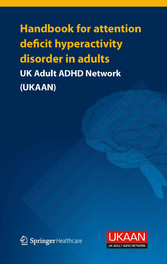Suchen und Finden
Handbook for Attention Deficit Hyperactivity Disorder in Adults
This book is a direct response to a severe treatment gap in recognising, treating and managing attention deficit hyperactivity disorder (ADHD) in adults. Affecting 3-4% of the global population, ADHD has long been considered a pediatric psychiatric condition and continues to be overlooked in adults, who often go on to endure a lifetime of clinically significant impairments that affect work performance, social behavior, and personal relationships. However, in the wake of the recognition of ADHD in adults in the Diagnostic and Statistical Manual of Mental Disorders IV (considered the absolute gold standard in psychiatry) and a greater number of pharmaceutical treatments being indicated for adults, this book will increase awareness of the condition and advocate expanding ADHD treatment across all age ranges. The book is especially relevant to psychiatrists, GPs, and specialist psychiatric nurses , while also a useful resource for patient societies and advocacy groups.
Professor Philip Asherson (MB, BS, MRCPsych, PhD) is Professor of Molecular Psychiatry at the MRC Social, Genetic & Developmental Psychiatry Centre at the Institute of Psychiatry, King's College London, UK, and consultant psychiatrist at the Maudsley Hospital. He earned his medical degree from The Royal London Hospital and his doctoral degree from the University of Wales. He was an MRC Clinical Research Fellow in the Department of Psychological Medicine and Institute of Medical Genetics at the University Of Wales College Of Medicine in Cardiff, where he worked on molecular genetic studies of schizophrenia. His current work focuses on clinical, quantitative genetic, and molecular genetic studies of ADHD across the lifespan. He has contributed to the development of mental health services for adults with ADHD in the UK. He is President of the UK Adult ADHD Network (www.UKAAN.org), a professional network that aims to support clinical research, education, and service provision for adults with ADHD. He was a member of the guideline development group for the National Institute of Health and Clinical Excellence (NICE) and contributed to published guidelines from NICE, the British Association of Psychopharmacology and the European Network Adult ADHD consensus paper. Current research includes followup studies of ADHD from childhood to adulthood, investigation of mood instability and emotional regulation in ADHD, treatment of ADHD in young offenders, defining the psychopathology of ADHD; and quantitative and molecular genetic studies of ADHD and associated cognitiveneurophysiological endophenotypes. He has published more than 220 peer reviewed articles, including guideline documents on diagnosis and treatment of ADHD in adults.
Alle Preise verstehen sich inklusive der gesetzlichen MwSt.








